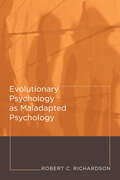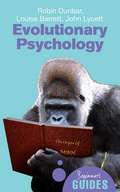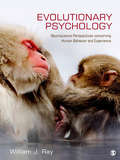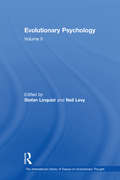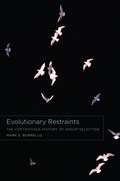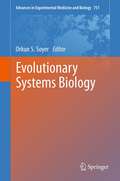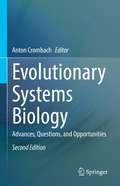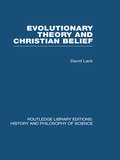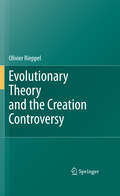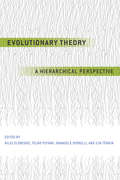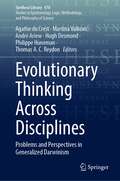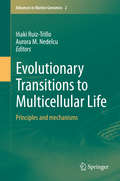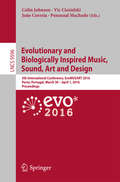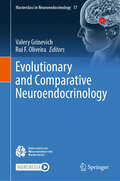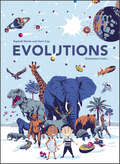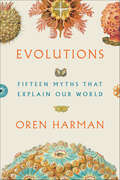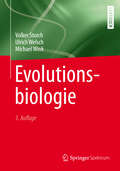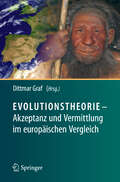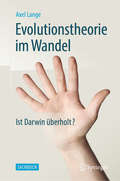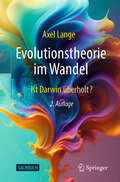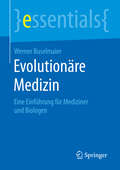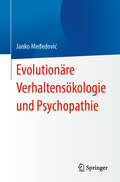- Table View
- List View
Evolutionary Psychology as Maladapted Psychology (Life and Mind: Philosophical Issues in Biology and Psychology)
by Robert C. RichardsonA philosopher subjects the claims of evolutionary psychology to the evidential and methodological requirements of evolutionary biology, concluding that evolutionary psychology's explanations amount to speculation disguised as results.Human beings, like other organisms, are the products of evolution. Like other organisms, we exhibit traits that are the product of natural selection. Our psychological capacities are evolved traits as much as are our gait and posture. This much few would dispute. Evolutionary psychology goes further than this, claiming that our psychological traits—including a wide variety of traits, from mate preference and jealousy to language and reason—can be understood as specific adaptations to ancestral Pleistocene conditions. In Evolutionary Psychology as Maladapted Psychology, Robert Richardson takes a critical look at evolutionary psychology by subjecting its ambitious and controversial claims to the same sorts of methodological and evidential constraints that are broadly accepted within evolutionary biology.The claims of evolutionary psychology may pass muster as psychology; but what are their evolutionary credentials? Richardson considers three ways adaptive hypotheses can be evaluated, using examples from the biological literature to illustrate what sorts of evidence and methodology would be necessary to establish specific evolutionary and adaptive explanations of human psychological traits. He shows that existing explanations within evolutionary psychology fall woefully short of accepted biological standards. The theories offered by evolutionary psychologists may identify traits that are, or were, beneficial to humans. But gauged by biological standards, there is inadequate evidence: evolutionary psychologists are largely silent on the evolutionary evidence relevant to assessing their claims, including such matters as variation in ancestral populations, heritability, and the advantage offered to our ancestors. As evolutionary claims they are unsubstantiated. Evolutionary psychology, Richardson concludes, may offer a program of research, but it lacks the kind of evidence that is generally expected within evolutionary biology. It is speculation rather than sound science—and we should treat its claims with skepticism.
Evolutionary Psychology: A Beginner's Guide (Beginner's Guides)
by Louise Barrett Robin Dunbar John LycettStarting with its origins in the work of Charles Darwin, the book covers all the key areas of evolutionary psychology, including the role played by genetics in our sexual behavior, parental decision-making, and how babies learn about and adapt to the world.
Evolutionary Psychology: Neuroscience Perspectives concerning Human Behavior and Experience
by William J. RayMany books in evolutionary psychology emphasize just a small part of the total picture. Evolutionary Psychology gives students a clear understanding of how current psychological knowledge of human behavior and experience draws from a variety of perspectives. It begins with an understanding of evolution and the close connection between organisms and their environment. It provides the student the basics necessary to see how the environment and the turning on and off of genes can influence humans and the cultures in which they live. The book shows that we solve certain problems of life as many species have done for years. It also shows a glimpse of human abilities not seen in other species. We use language. We purposely teach our children. We build large cities that survive long after a single generation. We create cultures that through their writings and art can influence other humans thousands of years later. Current research in social processes, decision making, and brain imaging is presented in a clear manner throughout the book. The book emphasizes developmental processes and family relationships, sexual and social relationships, as well as emotionality and language. The book concludes by applying an evolutionary understanding approach to examine the areas of health and disease, psychopathology, and culture.
Evolutionary Psychology: Volume II (The International Library of Essays on Evolutionary Thought)
by Neil LevyEvolutionary approaches to the study of human beings have been able to explain the origin and maintenance of many of the features of our bodies. Many thinkers believe that an evolutionary approach will be equally fruitful when it comes to explaining the features of our minds. Since our behaviour is driven by our minds, our cognitive dispositions and processes are likely to have been a target of selection and adaptation. This volume collects recent prominent explorations of this theme, as well as the voices of dissenters who argue that our minds are far more significantly the product of culture than of evolution.
Evolutionary Restraints: The Contentious History of Group Selection
by Mark E. BorrelloMuch of the evolutionary debate since Darwin has focused on the level at which natural selection occurs. Most biologists acknowledge multiple levels of selection--from the gene to the species. The debate about group selection, however, is the focus of Mark E. Borrello's Evolutionary Restraints. Tracing the history of biological attempts to determine whether selection leads to the evolution of fitter groups, Borrello takes as his focus the British naturalist V. C. Wynne-Edwards, who proposed that animals could regulate their own populations and thus avoid overexploitation of their resources. By the mid-twentieth century, Wynne-Edwards became an advocate for group selection theory and led a debate that engaged the most significant evolutionary biologists of his time, including Ernst Mayr, G. C. Williams, and Richard Dawkins. This important dialogue bled out into broader conversations about population regulation, environmental crises, and the evolution of human social behavior. By examining a single facet in the long debate about evolution, Borrello provides powerful insight into an intellectual quandary that remains relevant and alive to this day.
Evolutionary Restraints: The Contentious History of Group Selection
by Mark E. BorrelloMuch of the evolutionary debate since Darwin has focused on the level at which natural selection occurs. Most biologists acknowledge multiple levels of selection—from the gene to the species. The debate about group selection, however, is the focus of Mark E. Borrello’s Evolutionary Restraints. Tracing the history of biological attempts to determine whether selection leads to the evolution of fitter groups, Borrello takes as his focus the British naturalist V. C. Wynne-Edwards, who proposed that animals could regulate their own populations and thus avoid overexploitation of their resources. By the mid-twentieth century, Wynne-Edwards became an advocate for group selection theory and led a debate that engaged the most significant evolutionary biologists of his time, including Ernst Mayr, G. C. Williams, and Richard Dawkins. This important dialogue bled out into broader conversations about population regulation, environmental crises, and the evolution of human social behavior. By examining a single facet in the long debate about evolution, Borrello provides powerful insight into an intellectual quandary that remains relevant and alive to this day.
Evolutionary Systems Biology
by Orkun S. SoyerThe book aims to introduce the reader to the emerging field of Evolutionary Systems Biology, which approaches classical systems biology questions within an evolutionary framework. An evolutionary approach might allow understanding the significance of observed diversity, uncover "evolutionary design principles" and extend predictions made in model organisms to others. In addition, evolutionary systems biology can generate new insights into the adaptive landscape by combining molecular systems biology models and evolutionary simulations. This insight can enable the development of more detailed mechanistic evolutionary hypotheses.
Evolutionary Systems Biology: Advances, Questions, and Opportunities
by Anton CrombachThis new edition captures the advances made in the field of evolutionary systems biology since the publication of the first edition. The first edition focused on laying the foundations of evolutionary systems biology as an interdisciplinary field, where a way of thinking and asking questions is combined with a wide variety of tools, both experimental and theoretical/computational. Since publication of the first edition, evolutionary systems biology is now a well-known term describing this growing field. The new edition provides an overview of the current status and future developments of this interdisciplinary field. Chapters highlight several key achievements from the last decade and outline exciting new developments, including an understanding of the interplay between complexity and predictability in evolutionary systems, new viewpoints and methods to study organisms in evolving populations at the level of the genome, gene regulatory network, and metabolic network, and better analysis and modeling techniques that will open new avenues of scientific inquiry.
Evolutionary Systems and Society: A General Theory
by Vilmos CsányiThis work is a bold new effort to embrace all aspects of life--molecular, cellular, behavioral, and cultural--within the formulation of a general theory of evolution that extends classical Darwinian theory to include human society.
Evolutionary Theory and Christian Belief: The Unresolved Conflict (Routledge Library Editions: History & Philosophy of Science)
by David LackOriginally published in 1957. This book is concerned with the conflict between "Darwinism" as the Victorians called it, and Christianity, a conflict here re-stated in modern terms because it so vitally affects our understanding of human nature and human values today. The opening chapter describes the historical background. There is a short account of evolution and the argument over Genesis. The importance of natural selection is stressed, and rival theories as to the means of animal evolution are criticised. Discussions follow on whether the course of evolution has been random or determined, on the argument from design, death in nature, the biologist’s methods and the difficulties in evolutionary ethics.
Evolutionary Theory and the Creation Controversy
by Olivier RieppelEvolutionary theory addresses the phenomenon of the origin and diversity of plant and animal species that we observe. In recent times, however, it has become a predominant ideology which has gained currency far beyond its original confines. Attempts to understand the origin and historical development of human culture, civilization and language, of the powers of human cognition, and even the origin of the moral and ethical values guiding and constraining everyday life in human societies are now cast in an evolutionary context. In "Evolutionary Theory and the Creation Controversy" the author examines evolutionary theory from a historical perspective, explaining underlying metaphysical backgrounds and fundamental philosophical questions such as the paradoxical problem of change, existence and creation. He introduces the scientists involved, their research results and theories, and discusses the evolution of evolutionary theory against the background of Creationism and Intelligent Design.
Evolutionary Theory: A Hierarchical Perspective
by Telmo Pievani Emanuele Serrelli Niles Eldredge, Telmo Pievani, Emanuele Serrelli, and Ilya Tëmkin Ilya TëmkinThe natural world is infinitely complex and hierarchically structured, with smaller units forming the components of progressively larger systems: molecules make up cells, cells comprise tissues and organs that are, in turn, parts of individual organisms, which are united into populations and integrated into yet more encompassing ecosystems. In the face of such awe-inspiring complexity, there is a need for a comprehensive, non-reductionist evolutionary theory. Having emerged at the crossroads of paleobiology, genetics, and developmental biology, the hierarchical approach to evolution provides a unifying perspective on the natural world and offers an operational framework for scientists seeking to understand the way complex biological systems work and evolve. Coedited by one of the founders of hierarchy theory and featuring a diverse and renowned group of contributors, this volume provides an integrated, comprehensive, cutting-edge introduction to the hierarchy theory of evolution. From sweeping historical reviews to philosophical pieces, theoretical essays, and strictly empirical chapters, it reveals hierarchy theory as a vibrant field of scientific enterprise that holds promise for unification across the life sciences and offers new venues of empirical and theoretical research. Stretching from molecules to the biosphere, hierarchy theory aims to provide an all-encompassing understanding of evolution and—with this first collection devoted entirely to the concept—will help make transparent the fundamental patterns that propel living systems.
Evolutionary Thinking Across Disciplines: Problems and Perspectives in Generalized Darwinism (Synthese Library #478)
by Philippe Huneman Thomas A. C. Reydon Hugh Desmond Agathe Du Crest Martina Valković André AriewThis volume aims to clarify the epistemic potential of applying evolutionary thinking outside biology, and provides a survey of the current state of the art in research on relevant topics in the life sciences, the philosophy of science, and the various areas of evolutionary research outside the life sciences. By bringing together chapters by evolutionary biologists, systematic biologists, philosophers of biology, philosophers of social science, complex systems modelers, psychologists, anthropologists, economists, linguists, historians, and educators, the volume examines evolutionary thinking within and outside the life sciences from a multidisciplinary perspective. While the chapters written by biologists and philosophers of science address theoretical aspects of the guiding questions and aims of the volume, the chapters written by researchers from the other areas approach them from the perspective of applying evolutionary thinking to non-biological phenomena. Taken together, the chapters in this volume do not only show how evolutionary thinking can be fruitfully applied in various areas of investigation, but also highlight numerous open problems, unanswered questions, and issues on which more clarity is needed. As such, the volume can serve as a starting point for future research on the application of evolutionary thinking across disciplines.
Evolutionary Transitions to Multicellular Life
by Iñaki Ruiz-Trillo Aurora M. NedelcuThe book integrates our understanding of the factors and processes underlying the evolution of multicellularity by providing several complementary perspectives (both theoretical and experimental) and using examples from various lineages in which multicellularity evolved. Recent years marked an increased interest in understanding how and why these transitions occurred, and data from various fields are providing new insights into the forces driving the several independent transitions to multicellular life as well as into the genetic and molecular basis for the evolution of this phenotype. The ultimate goal of this book is to facilitate the identification of general and unifying principles and mechanisms.
Evolutionary and Biologically Inspired Music, Sound, Art and Design
by Penousal Machado Colin Johnson Vic Ciesielski João CorreiaThis book constitutes the refereed proceedings of the 5th International Conference on Evolutionary and Biologically Inspired Music, Sound, Art and Design, EvoMUSART 2016, held in Porto, Portugal, in March/April 2016, co-located with the Evo*2016 events EuroGP, EvoCOP and EvoApplications. The 17 revised full papers presented were carefully reviewed and selected from 25 submissions. The papers cover a wide range of topics and application areas, including generative approaches to music, graphics, game content, and narrative; music information retrieval; computational aesthetics; the mechanics of interactive evolutionary computation; and the art theory of evolutionary computation. /* Style Definitions */ table. MsoNormalTable {{mso-style-name:"Table Normal"; mso-tstyle-rowband-size:0; mso-tstyle-colband-size:0; mso-style-noshow:yes; mso-style-priority:99; mso-style-qformat:yes; mso-style-parent:""; mso-padding-alt:0in 5. 4pt 0in 5. 4pt; mso-para-margin:0in; mso-para-margin-bottom:. 0001pt; mso-pagination:widow-orphan; font-size:11. 0pt; font-family:"Calibri","sans-serif"; mso-ascii-font-family:Calibri; mso-ascii-theme-font:minor-latin; mso-fareast-font-family:"Times New Roman"; mso-fareast-theme-font:minor-fareast; mso-hansi-font-family:Calibri; mso-hansi-theme-font:minor-latin; mso-bidi-font-family:"Times New Roman"; mso-bidi-theme-font:minor-bidi;}}
Evolutionary and Comparative Neuroendocrinology (Masterclass in Neuroendocrinology #17)
by Valery Grinevich Rui F. OliveiraThis book delves into the intricate journey of neuroendocrine evolution, from its rudimentary origins in single-celled organisms to the complex systems found in mammals. It offers a comprehensive exploration of how neuropeptides and their receptors have evolved, highlighting the pivotal role of the hypothalamus and pituitary gland in this process. Key concepts covered include the evolution of neuropeptide signaling, insights from invertebrate hypothalamic-pituitary systems, and the functional trajectories of ancient peptide ligand-receptor systems. The book addresses critical questions such as the organization and evolution of neurotransmitter volume transmission, the form and function of growth hormone-releasing hormone across vertebrates, and the co-evolution of neuroendocrine signaling dyads. Chapters on the melanocortin system, corticotropin-releasing hormone, and nonapeptide regulation of social behavior in teleost fish provide a deep dive into specific pathways and their evolutionary significance. Aimed at researchers and professionals in neuroscience, endocrinology, and evolutionary biology, this text serves as an invaluable resource for anyone interested in the comparative anatomy and physiology of neuroendocrine systems. This is the seventeenth volume in the International Neuroendocrine Federation (INF) Masterclass in Neuroendocrinology series, which aims to illustrate the highest standards and highlight the latest technologies in basic and clinical research, and aspires to provide inspiration for further exploration into the exciting field of neuroendocrinology.
Evolutions
by Raphaël Martin Henri CapFrom the first cells to the appearance of humans on Earth, here is the great history of evolution in a single illustrated book. The most recent scientific information is made available to young readers through simple prose, with many anecdotes and concrete examples given by this team of three authors: a journalist, a specialist researcher, and a designer illustrator. From chapter to chapter, the reader understands that each part of his body comes to him from distant ancestors, some of them very surprising, such as archaea, viruses, jellyfish—or even strange fish from the oceans. Everything is clearly explained with the help of small paragraphs and very playful and educational illustrations, which allow children to learn while having fun. Are you ready to go on a journey of over four billion years to unravel the mysteries of evolution, the natural phenomenon that explains the wonderful diversity of the living world?
Evolutions: Fifteen Myths That Explain Our World
by Oren Harman“An absolute joy to read . . . it is Harman’s skill in blending contemporary science and traditional storytelling that makes this book truly brilliant.” —Randy Rosenthal, New York Journal of BooksWe no longer think, like the ancient Chinese did, that the world was hatched from an egg, or, like the Maori, that it came from the tearing-apart of a love embrace. The Greeks told of a tempestuous Hera and a cunning Zeus, but we now use genes and natural selection to explain fear and desire, and physics to demystify the workings of the universe.Science is an astounding achievement, but are we really any wiser than the ancients? Has science revealed the secrets of fate and immortality? Has it provided protection from jealousy or love? There are those who believe that science has replaced faith, but must it also be a death knell for mythology?Evolutions brings to life the latest scientific thinking on the birth of the universe and the solar system, the journey from a single cell all the way to our human minds. Reawakening our sense of wonder, Oren Harman uses modern science to create new and original mythologies. Here are the earth and the moon presenting a cosmological view of motherhood, a panicking mitochondrion introducing sex and death to the world. Science may not solve our existential puzzles, but like the age-old legends, its magical discoveries can help us continue the never-ending search.“Breathtaking . . . The processes of evolution are at times so huge and ungraspable for the mind—so magical—that they can perhaps only be fathomed through the language of myth . . . Brilliant.” —Karin Altenberg, Wall Street Journal“Harman is a marvelous intellectual companion.” —David B. Green, Haaretz
Evolutionsbiologie
by Michael Wink Volker Storch Ulrich WelschDie gut eingeführte "Evolutionsbiologie" von Volker Storch, Ulrich Welsch und Michael Wink liegt inzwischen in 3., sehr gründlich überarbeiteter und aktualisierter Neuauflage vor. Die Autoren schildern den bisherigen Ablauf der Evolution der Organismen durch die Jahrmillionen, die molekularen Grundlagen der Evolution und - unter verschiedenen Aspekten - die Evolution des Menschen und seiner nächsten Verwandten. Zahlreiche Exkurse, viele von renommierten Wissenschaftlern verfasst, erläutern besonders aktuelle Themen.
Evolutionsbiologie
by Michael Wink Volker Storch Ulrich WelschDie gut eingeführte "Evolutionsbiologie" von Volker Storch, Ulrich Welsch und Michael Wink liegt inzwischen in 3., sehr gründlich überarbeiteter und aktualisierter Neuauflage vor. Die Autoren schildern den bisherigen Ablauf der Evolution der Organismen durch die Jahrmillionen, die molekularen Grundlagen der Evolution und - unter verschiedenen Aspekten - die Evolution des Menschen und seiner nächsten Verwandten. Zahlreiche Exkurse, viele von renommierten Wissenschaftlern verfasst, erläutern besonders aktuelle Themen.
Evolutionstheorie - Akzeptanz und Vermittlung im europäischen Vergleich
by Dittmar GrafDie Evolutionstheorie hat sich in den letzten 150 Jahren von einer speziellen naturwissenschaftlichen zur universellen wissenschaftlichen Theorie entwickelt. Sie bezieht Phänomene von der Lebensentstehung bis zu den kulturellen und geistigen Entwicklungen des Menschen ein. Die Evolutionstheorie ist das Fundament der modernen Biologie. Dennoch ist sie bis heute die vermutlich umstrittenste Theorie der Menschheitsgeschichte. Ein großer Teil der Menschen in aller Welt lehnt sie bis heute vehement ab. Das Buch nähert sich diesem Phänomen, indem es einerseits einen interdisziplinären Einblick in die evolutionäre Forschung ermöglicht und damit Wissenschaftler aus unterschiedlichen Disziplinen die Möglichkeit bietet, über ihre Forschung zu berichten. Andererseits schildern Forscher aus verschiedenen europäischen Ländern die spezifischen Schwierigkeiten bezüglich der Akzeptanz der Evolutionstheorie.
Evolutionstheorie im Wandel: Ist Darwin überholt?
by Axel LangeDie klassische Evolutionstheorie ist unvollständig. Zwar ist die heutige Theorie, die auf Darwin basiert, anhaltend erfolgreich. Doch auf viele Fragen bietet sie keine Erklärung. Welche Vererbungsformen existieren neben der genetischen? Wie entstehen komplexe Variationen im Embryo und evolutionäre Innovationen, z.B. Vogelfeder oder Schildkrötenpanzer? Wie wirkt die Umwelt auf die Entwicklung der Arten und wie verändern Arten ihre Umwelt? Warum ist die Evolution von Vögeln, Korallen oder menschlicher Kultur mit der natürlichen Selektion allein nicht erklärbar? Immer stärkere Forderungen treten auf, die Synthetische Theorie umfassend zu erweitern. Die Erkenntnisse der letzten Jahrzehnte machen ein erhebliches Um- und Neudenken erforderlich. Unsere KI-basierte, nicht-biologische Technosphäre ist in die Evolutionstheorie zu integrieren. Das verständlich geschriebene, exzellent recherchierte Buch liefert spannende neue Erkenntnisse und ist gespickt mit faszinierenden neuen Beispielen aus der Evolutionsbiologie.
Evolutionstheorie im Wandel: Ist Darwin überholt?
by Axel LangeDie klassische Evolutionstheorie ist unvollständig. Zwar ist die heutige Theorie, die auf Darwin zurückgeht, anhaltend erfolgreich. Doch auf viele Fragen bietet sie keine Erklärung. Welche Vererbungsformen existieren neben der genetischen? Wie entstehen komplexe Variationen im Embryo und vor allem evolutionäre Innovationen, z.B. Vogelfeder oder Schildkrötenpanzer? Wie wirkt die Umwelt auf die Entwicklung der Arten und wie verändern Arten zugleich ihre eigene Umwelt? Warum ist die Evolution von Vögeln, Korallen oder menschlicher Kultur mit der natürlichen Selektion allein nicht erklärbar?Immer stärkere Forderungen treten auf, die Synthetische Theorie umfassend zu erweitern. Die wissenschaftlichen Erkenntnisse der letzten Jahrzehnte machen ein erhebliches Um- und Neudenken erforderlich. Unsere KI-basierte, nicht-biologische Technosphäre ist in die Evolutionstheorie zu integrieren. Das verständlich geschriebene und exzellent recherchierte Buch liefert die spannenden neuen Erkenntnisse hierzu und ist gespickt mit faszinierenden neuen Beispielen aus der Evolutionsbiologie. Alle Kapitel wurden für diese Ausgabe auf den neuesten Stand gebraucht. Noch deutlicher als die erste Auflage vermitteln die aktualisierten Inhalte in diesem Band das starke Um- und Neudenken in der Evolutionstheorie.
Evolutionäre Medizin: Eine Einführung für Mediziner und Biologen (essentials)
by Werner BuselmaierWerner Buselmaier erläutert, dass die evolutionäre Medizin den Menschen als Ergebnis einer langen Entwicklung sieht. Diese Betrachtungsweise im Licht der Evolution ist für das Verständnis der Natur des gesunden wie des kranken Menschen von außerordentlicher Bedeutung. Die zunehmende Erkenntnis, dass es zum vollständigen Verständnis einer Krankheit sowohl unmittelbarer als auch evolutionsbiologischer Erklärungen bedarf, wird in allerjüngster Zeit auch in die Medizinerausbildung eingebracht.
Evolutionäre Verhaltensökologie und Psychopathie
by Janko MeđedovićDieses Buch beleuchtet das Forschungsgebiet der Psychopathie anhand eines verhaltensökologischen Rahmens. Es besteht aus zwei Teilen. Der erste Teil vermittelt wissenschaftliche Erkenntnisse der menschlichen Verhaltensökologie, einschließlich:Grundlegende Konzepte der EvolutionsbiologieEvolutionäre VerhaltenswissenschaftenEvolutionsökologie der FamilieEvolutionäre KompromisseTheorie der LebensgeschichteVerhaltensökologie der PersönlichkeitPsychopathie und ihre aktuelle Entwicklung.Der zweite Teil des Buches beschreibt die empirische Forschung zur Psychopathie in einem evolutionsökologischen Kontext, der darauf abzielt, Kompromisse zwischen Fruchtbarkeit und Lebenserwartung bei Psychopathie, interagierende Phänotypen bei Psychopathie und elterliche Effekte im Zusammenhang mit Psychopathie zu untersuchen. Dieser Teil enthält die Diskussion der Ergebnisse der Studie, die auf mehreren theoretischen Konzepten basiert, die im ersten Teil beschrieben wurden.Dieser Band ist ideal für alle Wissenschaftler, die sich mit dem Thema Psychopathie beschäftigen und eine neue und zukunftsorientierte Brücke zwischen den Natur- und Sozialwissenschaften bauen wollen.Die Übersetzung wurde mit Hilfe von künstlicher Intelligenz durchgeführt. Eine anschließende menschliche Überarbeitung erfolgte vor allem in Bezug auf den Inhalt.
